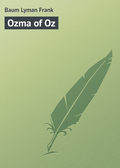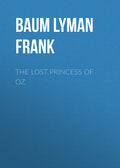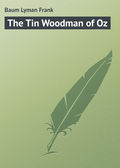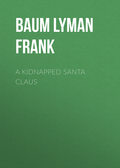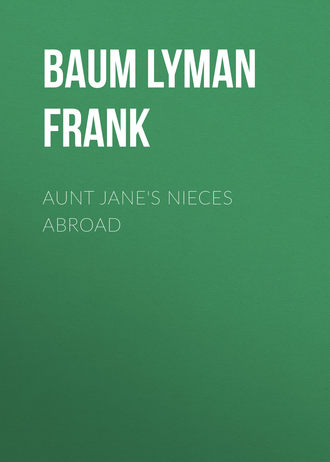
Лаймен Фрэнк Баум
Aunt Jane's Nieces Abroad
Then he caught a word or two of English that made him start. He went to the door between the two rooms and threw it open, finding himself face to face with Count Ferralti.
CHAPTER XVIII
GUESTS OF THE BRIGAND
"Good morning, Count," said Uncle John, cheerfully.
The other stared at him astonished.
"Good heavens! Have they got you, too?" he exclaimed.
"Why, I'm visiting his excellency, Il Duca, if that's what you mean," replied Mr. Merrick. "But whether he's got me, or I've got him, I haven't yet decided."
The young man's jaw was tied in a bandage and one of his eyes was black and discolored. He looked agitated and miserable.
"Sir, you are in grave danger; we are both in grave danger," he announced, "unless we choose to submit to being robbed by this rascally brigand."
"Then," observed Uncle John, "let's submit."
"Never! Not in a thousand years!" cried Ferralti, wildly. And then this singular young man sank into a chair and burst into tears.
Uncle John was puzzled. The slender youth – for he was but a youth in spite of his thin moustaches – exhibited a queer combination of courage and weakness; but somehow Uncle John liked him better at that moment than he ever had before. Perhaps because he now realized he had unjustly suspected him.
"You seem to have been hurt, Count," he remarked.
"Why, I was foolish enough to struggle, and that brute Tommaso pounded me," was the reply. "You were wise to offer no resistance, sir."
"As for that, I hadn't a choice," said Uncle John, smiling. "When did they get you, Ferralti?"
"Last evening. I walked in the garden of the hotel and they threw a sack over my head. I resisted and tried to cry out. They beat me until I was insensible and then brought me here, together with my travelling cases, which they removed from my room to convey the impression that I had gone away voluntarily. When I awakened from my swoon I was in this room, with the doctor bending over me."
"The doctor?"
"Oh, they have a doctor in this accursed den, as well as a priest and a lawyer. The Duke entreated my pardon. He will punish his men for abusing me. But he holds me a safe prisoner, just the same."
"Why?"
"He wants a ransom. He will force me to purchase an ancient brass candlestick for fifty thousand lira."
Uncle John looked at his companion thoughtfully.
"Tell me, Count Ferralti," he said, "who you really are. I had believed you were Il Duca's accomplice, until now. But if he has trapped you, and demands a ransom, it is because you are a person of some consequence, and able to pay. May I not know as much about your position in life as does this brigand duke?"
The young man hesitated. Then he spread out his hands with an appealing gesture and said:
"Not yet, Mr. Merrick! Do not press me now, I implore you. Perhaps I have done wrong to try to deceive you, but in good time I will explain everything, and then you will understand me better."
"You are no count."
"That is true, Mr. Merrick."
"You are not even an Italian."
"That is but partly true, sir."
"You have seen fit to deceive us by – "
Tommaso threw wide the door.
"Il dejuné é servito," he said gruffly.
"What does that mean?" asked Uncle John.
"Luncheon is ready. Shall we go down?"
"Yes; I'm hungry."
They followed the man to the lower floor, where he ushered them into a low, cool room where a long table was set. The walls were whitewashed and bore some religious prints, gaudily colored. A white cloth covered the table, which was well furnished with modern crockery and glass, and antique silverware.
At the head of the table were two throne-like chairs, one slightly larger and more elevated than the other. In the more important seat was a withered old woman with a face like that of a mummy, except that it was supplied with two small but piercing jet eyes that seemed very much alive as they turned shrewdly upon the strangers. She was the only one of the company they found seated. The Duke stood behind the smaller chair beside her, and motioned the Americans to occupy two places at the side of the table next him. Opposite them, in the places adjoining the elevated dais, were two remarkable individuals whom Uncle John saw for the first time. One was a Cappuccin monk, with shaven crown and coarse cassock fastened at the waist by a cord. He was blind in one eye and the lid of the other drooped so as to expose only a thin slit. Fat, awkward and unkempt, he stood holding to the back of his chair and swaying slightly from side to side. Next tohim was a dandified appearing man who was very slight and thin of form but affected the dress and manners of extreme youth. Ferralti whispered to Uncle John that this was the doctor.
The table dropped a step in heighth from these places, and the balance of its length was occupied by several stalwart Sicilians, clothed in ordinary peasant costume, and a few silent, heavy-featured women. Tato was not present.
"Signori," said the Duke to the Americans, "allow me to present you to my mother, the head of our illustrious family; one who is known, admired and feared throughout Sicily as her Excellenza la Duchessa d'Alcanta."
With the words the Duke bowed low to the old woman. Uncle John and Ferralti also bowed low. The lines of servitors humbly bent themselves double. But the Duchessa made no acknowledgment. Her bead like eyes searched the faces of the "guests" with disconcerting boldness, and then dropped to her plate.
At this signal the fat priest mumbled a blessing upon the food, the Duke waved his hand, and all the company became seated.
Uncle John felt as if he were taking part in a comic opera, and enjoyed the scene immensely. But now his attention was distracted by the stewards bringing in steaming platters of macaroni and stewed mutton, from which they first served the Duchessa, and then the Duke, and afterward the guests. The servants waited hungry-eyed until these formalities were completed, and then swept the platters clean and ate ravenously.
Uncle John plied his knife and fork busily and found the food excellently prepared. Ferralti seemed to have little appetite. Some of his teeth had been knocked out and his broken wrist, which had but partially healed, had been wrenched in the scrimmage of the night before so that it caused him considerable pain.
The Duke attempted little conversation, doubtless through deference to the aged Duchessa, who remained absolutely silent and unresponsive to her surroundings. He praised his wine, however, which he said was from their own vineyards, and pressed the Americans to drink freely.
When she had finished her meal the Duchessa raised a hand, and at the signal the whole company arose and stood at their places while two of the women assisted her to retire. She leaned upon their shoulders, being taller than her son, but displayed surprising vigor for one so advanced in years.
When she had gone the others finished at their leisure, and the conversation became general, the servants babbling in their voluble Italian without any restraint whatever.
Then the Duke led his prisoners to the veranda and offered them cigars. These were brought by Tato, who then sat in the duke's lap and curled up affectionately in his embrace, while the brigand's expression softened and he stroked the boy's head with a tender motion.
Uncle John watched the little scene approvingly. It was the first time he had seen Tato since the child had lured him through the tunnel.
"Your son, Duke?" he asked.
"Yes, signore; my only child. The heir to my modest estate."
"And a very good brigand, already, for his years," added Mr. Merrick. "Ah, Tato, Tato," shaking his head at the child, "how could you be so cruel as to fool an innocent old chap like me?"
Tato laughed.
"I did not deceive you, signore. You but misunderstood me. I said Signor Ferralti was hurt, and so he was."
"But you said he needed my assistance."
"Does he not, signore?"
"How do you speak such good English?"
"Father Antoine taught me."
"The monk?"
"Yes, signore."
"My child is a linguist," remarked the Duke, complacently. "Sh – he has been taught English, German and French, even from the days of infancy. It is very good for me, for now Tato can entertain my guests."
"Have you no Italian guests, then?" asked Uncle John.
"No, since Italy owns Sicily, and I am a loyal subject. Neither have I many Germans or Frenchmen, although a few wander my way, now and then. But the Americans I love, and often they visit me. There were three last year, and now here are two more to honor me with their presence."
"The Americans make easier victims, I suppose."
"Oh, the Americans are very rich, and they purchase my wares liberally. By the way, Signor Ferralti," turning to the young man, "have you decided yet the little matter of your own purchase?"
"I will not buy your candlestick, if that is what you refer to," was the response.
"No?"
"By no means. Fifty thousand lira, for a miserable bit of brass!"
"But I forgot to tell you, signore; the candlestick is no longer for sale," observed the Duke, with an evil smile. "Instead, I offer you a magnificent bracelet which is a hundred years old."
"Thank you. What's the price?"
"A hundred thousand lira, signore."
Ferralti started. Then in turn he smiled at his captor.
"That is absurd," said he. "I have no wealth at all, sir, but live on a small allowance that barely supplies my needs. I cannot pay."
"I will take that risk, signore," said the brigand, coolly. "You have but to draw me an order on Mr. Edward Leighton, of New York, for one hundred thousand lira – or say twenty thousand dollars – and the bracelet is yours."
"Edward Leighton! My father's attorney! How did you know of him, sir?"
"I have an agent in New York," answered the Duke, "and lately I have been in your city myself."
"Then, if you know so much, you scoundrelly thief, you know that my father will not honor a draft for such a sum as you demand. I doubt if my father would pay a single dollar to save me from assassination."
"We will not discuss that, signore, for I regret to say that your father is no longer able to honor drafts. However, your attorney can do so, and will, without question."
Ferralti stared at him blankly.
"What do you mean by that?" he demanded.
The Duke shook the ashes from his cigar and examined the glowing end with interest.
"Your father," was the deliberate reply, "was killed in a railway accident, four days ago. I have just been notified of the fact by a cable from America."
Ferralti sat trembling and regarding the man with silent horror.
"Is this true, sir?" asked Uncle John, quickly; "or is it only a part of your cursed game?"
"It is quite true, signore, I regret being obliged to break the ill news so abruptly; but this gentleman thought himself too poor to purchase my little bracelet, and it was necessary to inform him that he is suddenly made wealthy – not yet so great a Croesus as yourself, Signor Merreek, but still a very rich man."
Ferralti ceased trembling, but the horror still clung to his eyes.
"A railway wreck!" he muttered, hoarsely. "Where was it, sir? Tell me, I beseech you! And are you sure my father is dead?"
"Very sure, signore. My informant is absolutely reliable. But the details of the wreck I do not know. I am only informed of the fact of your father's death, and that his will leaves you his entire fortune."
Ferralti arose and staggered away to his room, and Uncle John watched him go pityingly, but knew no way to comfort him. When he had gone he asked gently:
"His father was an American, Duke?"
"Yes, signore."
"And wealthy, you say?"
"Exceedingly wealthy, signore."
"What was his name?"
"Ah; about that ring, my dear guest. Do you think a hundred and fifty thousand lira too much for it?"
"You said a hundred thousand."
"That was this morning, signore. The ring has increased in value since. To-morrow, without doubt, it will be worth two hundred thousand."
Tato laughed at the rueful expression on the victim's face, and, a moment after, Uncle John joined in his laughter.
"Very good, duke," he said. "I don't wish to rob you. Let us wait until to-morrow."
The brigand seemed puzzled.
"May I ask why, Signor Merreek – since you are warned?" he enquired.
"Why, it's this way, Duke. I'm just a simple, common-place American, and have lived a rather stupid existence for some time. We have no brigands at home, nor any hidden valleys or protected criminals like yourself. The romance of my surroundings interests me; your methods are unique and worth studying; if I am so rich as you think me a few extra hundred thousand lira will be a cheap price to pay for this experience. Is it not so?"
The Duke frowned.
"Do you play with me?" he asked, menacingly.
"By no means. I'm just the spectator. I expect you to make the entertainment. I'm sure it will be a good show, although the price is rather high."
Il Duca glared, but made no reply at the moment. Instead, he sat stroking Tato's hair and glowering evilly at the American.
The child whispered something in Italian, and the man nodded.
"Very well, signore," he said, more quietly. "To-morrow, then, if it so pleases you."
Then, taking Tato's hand, he slowly arose and left the veranda.
For a moment the American looked after them with a puzzled expression. Then he said to himself, with a smile: "Ah, I have solved one mystery, at any rate. Tato is a girl!"
CHAPTER XIX
A DIFFICULT POSITION
And now Uncle John, finding himself left alone, took his walkingstick and started out to explore the valley.
He felt very sorry for young Ferralti, but believed his sympathy could in no way lighten the blow caused by the abrupt news of his parent's death. He would wish to be alone with his grief for a time. By and by Mr. Merrick intended to question his fellow prisoner and try to find out something of his history.
The dale was very beautiful as it lay basking in the afternoon sun. Near the house was a large vegetable garden, which, being now shaded by the overhanging cliffs, was being tended by a sour-visaged Sicilian. Uncle John watched him for a time, but the fellow paid no heed to him. Every servant connected with the duke's establishment seemed surly and morose, and this was the more remarkable because the country folk and villagers Uncle John had met were usually merry and light-hearted.
Down by the brook were green meadows and groves of fruit trees. The little gentleman followed the stream for some distance, and finally came upon a man seated on the bank above a broad pool, intently engaged in fishing. It proved to be the dandified old doctor, who wore gloves to protect his hands and a broad-rimmed straw hat to shade his face.
Uncle John stood beside the motionless figure for a moment, watching the line. Then, forgetting he was in a foreign country, he asked carelessly:
"Any luck?"
"Not yet," was the quiet reply, in clear English. "It is too early to interest the fishes. An hour later they will bite."
"Then why did you come so soon?"
"To escape that hell-hole yonder," nodding his head toward the house.
Uncle John was surprised.
"But you are not a prisoner, doctor," he ventured to say.
"Except through the necessity of earning a livelihood. Il Duca pays well – or rather the Duchessa does, for she is the head of this household. I am skillful, and worth my price, and they know it."
"You say the Duchessa is the head of the house?"
"Assuredly, signore. Il Duca is her slave. She plans and directs everything, and her son but obeys her will."
"Did she send him to America?"
"I think so. But do not misunderstand me. The Duke is clever on his own account, and almost as wicked as his old mother. And between them they are training the child to be as bad as they are. It is dreadful."
"Have you been here long?"
"For seven years, signore."
"But you can resign whenever you please?"
"Why not? But the doubt makes me uneasy, sometimes. In another year I would like to go to Venice, and retire from professional life. I am a Venetian, you observe; no dastardly brigand of a Sicilian. And in another year I shall have sufficient means to retire and end my days in peace. Here I save every centessimo I make, for I can spend nothing."
Uncle John sat down upon the bank beside the confiding Venetian.
"Doctor," said he, "I am somewhat puzzled by this man you call Il Duca, as well as by my audacious capture and the methods employed to rob me. I'd like your advice. What shall I do?"
"The only possible thing, signore. Submit."
"Why is it the only possible thing?"
"Have you not yet discovered? Unless you pay, your friends will never hear from you again. Il Duca, by his mother's favor, is king here. He will murder you if you oppose his demands."
"Really?"
"It is quite certain, signore. He has murdered several obstinate people since I have been here, and the outside world will never know their fate. It is folly to oppose the king. Were you not rich you would not be here. Il Duca knows the exact wealth of every American who travels abroad and is likely to visit Sicily. Many escape him, but a few wander into his toils, for he is wonderfully sagacious. Mark you: he does not demand your all; he merely takes tribute, leaving his victims sufficient to render life desirable to them. If he required their all, many would as soon forfeit life as make the payment; but a tithe they will spare for the privilege of living. That is why he is so successful. And that is why he remains undisturbed. For an American, being robbed so simply, never tells of his humiliating experience. He goes home, and avoids Sicily ever after."
"H-m-m. I understand."
"But if you do not pay, you are not permitted to leave this place. You are killed at once, and the incident is over. Il Duca does not love to murder, but he takes no chances."
"I see. But suppose I pay, and then make complaint to the Italian government?"
"It has been done, signore. But the government is very blind. It does not know Il Duca d' Alcanta. Its officials are convinced he does not exist. They investigate carefully, and declare the tale is all a myth."
"Then there is no way of escape?"
"Absolutely none. Such a condition is almost inconceivable, is it not? and in this enlightened age? But it exists, and is only harmful when its victims are stubborn and rebellious. To be cheerful and pay promptly is the only sensible way out of your difficulty."
"Thank you," said Uncle John. "I shall probably pay promptly. But tell me, to satisfy my curiosity, how does your duke murder his victims?"
"He does not call it murder, as I do; he says they are suicides, or the victims of accident. They walk along a path and fall into a pit. It is deep, and they are killed. The pit is also their tomb. They are forgotten, and the trap is already set for their successors."
"Rather a gloomy picture, doctor."
"Yes. I tell you this because my nature is kind. I abhor all crime, and much prefer that you should live. But, if you die, my salario continues. I am employed to guard the health of the Duke's family – especially the old Duchessa – and have no part in this detestable business."
"Isn't that a bite?"
"No, signore. It is the current. It is not time for the fish to bite."
Uncle John arose.
"Good afternoon, doctor."
"Good afternoon, signore."
He left the old fellow sitting there and walked on. The valley was about a half mile long and from a quarter to a third of a mile in width. It resembled a huge amphitheatre in shape.
The American tramped the length of the brook, which disappeared into the rocky wall at the far end. Then he returned through the orchards to the house.
The place was silent and seemed deserted. There was a languor in the atmosphere that invited sleep. Uncle John sought his room and lay down for an afternoon nap, soon falling into a sound slumber.
When he awoke he found Ferralti seated beside his bed. The young man was pale, but composed.
"Mr. Merrick," said he, "what have you decided to do?"
Uncle John rubbed his eyes and sat up.
"I'm going to purchase that ring," he answered, "at the best price the Duke will make me."
"I am disappointed," returned Ferralti, stiffly. "I do not intend to allow myself to be robbed in this way."
"Then write a farewell letter, and I'll take it to your friends."
"It may not be necessary, sir."
Uncle John regarded him thoughtfully.
"What can you do?" he asked.
Ferralti leaned forward and whispered, softly: "I have a stout pocket-knife, with a very long blade. I shall try to kill the Duke. Once he is dead his people will not dare to oppose us, but will fly in terror. It is only Il Duca's audacity and genius that enables this robber's den to exist."
"You would rather attempt this than pay?"
"Sir, I could not bear the infamy of letting this scoundrel triumph over me."
"Well, Ferralti, you are attempting a delicate and dangerous task, but so far as I can, I will help you."
He took the revolver from his pocket and handed it to his companion.
"It's loaded in every chamber," he whispered. "Perhaps it will serve your purpose better than a knife."
Ferralti's eyes sparkled.
"Good!" he exclaimed, concealing the weapon. "I shall watch for my opportunity, so as to make no mistake. Meantime, do you bargain with the Duke, but postpone any agreement to pay."
"All right, my lad. I'll wait to see what happens. It may add a good deal to the cost of that ring, if you fail; but I'll take the chances of that for the sake of the game."
He paused a moment, and then added:
"Is your father really dead, Count?"
"Yes; the Duke has sent me the cablegram he received from his agent. I cannot doubt his authority. My father and I have not been friendly, of late years. He was a severe man, cold and unsympathetic, but I am sorry we could not have been reconciled before this awful fate overtook him. However, it is now too late for vain regrets. I tried not to disobey or antagonize my one parent, but he did not understand my nature, and perhaps I failed to understand his."
He sighed, and rising from his chair walked to the window to conceal his emotion.
Uncle John remained silent, and presently Tommaso entered to notify them that dinner would be served in a half hour, and the Duke expected them to join him at the table.
The next morning Mr. Merrick bargained pleasantly with his jailer, who seemed not averse to discussing the matter at length; but no conclusion was reached. Ferralti took no part in the conversation, but remained sullen and silent, and the Duke did not press him.
The day after, however, he insisted that he had dallied long enough, although after much argument on the part of his enforced guests he agreed to give them three days to decide, with the understanding that each day they delayed would add a goodly sum to their ransom. If at the end of the three days the Americans remained obdurate, he would invite them to take a little walk, and the affair would be terminated.
Ferralti hugged his revolver and awaited his opportunity. It seemed to Uncle John that he might have had a hundred chances to shoot the brigand, who merited no better fate than assassination at their hands; but although Ferralti was resolved upon the deed he constantly hesitated to accomplish it in cold blood, and the fact that he had three days grace induced him to put off the matter as long as possible.
He came to regret most bitterly his indecision; for something in the young man's eyes must have put the brigand on his guard. When they awoke on the third morning, which was the fifth since their imprisonment, some one had searched their rooms thoroughly. The revolver and the knife were both gone, and the loss rendered them absolutely helpless.



